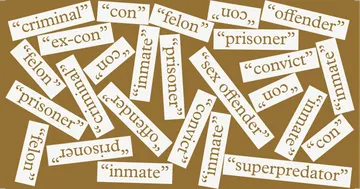For those of you reading this who feel trapped or are going stir-crazy due to your coronavirus-induced confinement, the best advice I can give you—as someone used to suffering in long-term confinement—is to take a pause, inhale a few deep breaths, then look around at all the things you have to be grateful for.
That's what I've done each and every day for the past 25 years. Every morning when I awaken in my 8-by-10-foot cell, I peer out my small window and thank the Universe for such a view. It's not much, mostly razor wire and uniform-clad convicts. But out past all those layers of fencing rests a few acres of deep forest, teeming with life.
I've found that during trying times like these, the simplest things matter the most. Sure, you're trapped inside your home or apartment, but all's not lost. Hopefully you have family, friends or loved ones with you, or maybe a trusted pet. (Or if not, you’ve got wi-fi!)
Me, I have my trusted canine, Tootsie, a 15-month-old black lab, whom I am currently training to be a service dog for Paws With a Cause. But I have no family members or loved ones, only a cellmate who snores like a freight train and often whines insincerely about how he'd rather be dead than in prison.
You also have your own bathroom and kitchen, which, I hope, given your access to the world of commercial sanitizing products, are corona free. I have none of these spaces. I share a bathroom with 96 other convicts. In my cell I have a narrow, lumpy mattress and a middle school-sized desk that I cram myself into while writing, as I am now as I type this.
Look around the room you are in. What do you see? I bet all kinds of welcoming things that speak of safety and comfort. Things like a favorite chair, or painting, or maybe some family heirloom that's been passed down from an elderly loved one.
Take comfort in these things. They are important. I know, because as the years drag on for me here behind bars, those are the things I pine for the most. The things I most look forward to seeing when I finally go home, whatever the world may be like when I get there.
And for some reason if you still find yourself going stir-crazy after all the deep breaths and the journey inwards, then try more straightforwardly considering my situation. I'd give anything to trade places with you right now. And when I say anything, I mean anything. If I owned a billion dollars I'd offer it over to you. A hundred billion. A trillion.
That's because I'm scared to death. I may die all alone in prison without any of my loved ones around to comfort me and send me off. I don't want the last faces I see to be those of the two cruel prison guards assigned to watch over me while I slip away.
And let's be honest, I now live in a death trap.
It's almost as if the coronavirus were specifically designed to kill off those locked away from society. I know this isn't literally the case. But this is a virus that is airborne and most affects people in confined, overcrowded spaces. It also likes to kill people like me with underlying chronic health issues (I suffer from kidney disease).
There is no place for us to hide. We have no home to sequester ourselves in. It is physically impossible for us to separate.
The way I am seeing it right now, this will go on until those of us imprisoned are all dead, or at the very least, until half of us have perished, leaving the other half to now-open single-man cells in which we can hide.
So my friend, would you like to switch places? I bet your home doesn't seem so claustrophobic now, does it?
I did commit a crime, which I reckon with daily and deeply. And I did deserve to come to prison. But I do not deserve a lonely death because of it. Neither do you.
Jerry Metcalf, 45, is a writer incarcerated at the Thumb Correctional Facility in Lapeer, Michigan, where he is serving 40 to 60 years for second-degree murder and two years for a weapons felony; he was convicted of both in 1996. In addition to his published work, he volunteers as an aid to the mentally ill and trains service dogs for Paws with a Cause.
